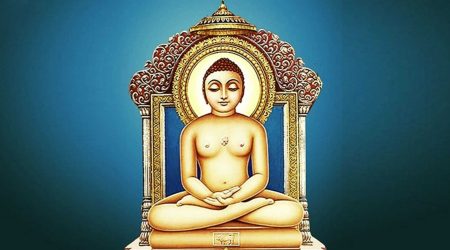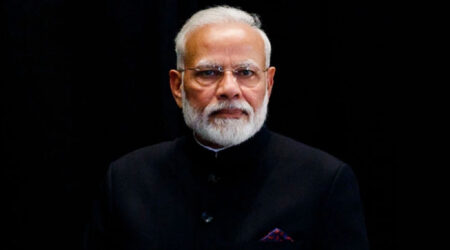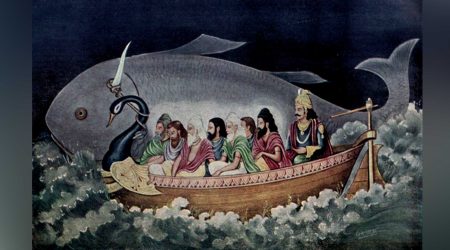By Bal Ram Singh, PhD
In the Kishkindha Kand of Ramcharitmanas, Goswarmi presents a chaupai expressing the views of King Bali who was mortally wounded by the arrow of Ram:
जन्म जन्म मुनि जतनु कराहीं। अंत राम कहि आवत नाहीं।। (Baal Kaand, 4.12)
Janam Janam Muni Jatan Karahi, Ant Ram Kahi Aawat Nahi
Meaning, that even sages take birth after birth, doing all sorts of efforts, but at the end of their lives, they are not able to focus (utter) the name of Ram. This implies that Ram’s character is enlightening, relieving one from all sorts of attachments. A person focusing on Ram at the time of leaving this world would mean that such a person has realized the completeness of the world with Ram’s character. The only person historically known to utter Ram at the end of his life has been Mahatma Gandhi.
Ram thus represents the truth for the world to realize, and a practice of Ram Raj may, in fact, be the beginning of a new world order. The entire world has become one at a certain level due to globalization and information technology.
The problems of the world, be it economic, environmental, terrorism, or social are now invading continents after continents. Mahatma Gandhi is becoming ever more popular in the entire world, but India, his karmabhumi, seems to have abandoned his basic philosophy of creating a just and peaceful society.
It is well known that Ram was the ideal of Mahatma Gandhi in life until his death. Mahatma Gandhi’s ideas had a fundamental framework of freedom for all, and he had considered the education system to be the true vehicle to achieve this freedom. In this approach he denounced the dominant Western culture and education system then and would have denounced it more today given the accelerated deterioration of society and the environment inculcated by the Western education model to support the Western lifestyle. Fundamental principles of freedom and self-reliance behind Gandhi’s views must be re-examined, reinforced, and revived for the welfare of modern society universally. Gandhi himself had suggested the concept of Ram-rajya as the model for a political system to implement his ideas of freedom and self-reliance for social equality and empowerment.
It is imperative to examine the current political system and its appropriateness for the holistic development of a global society. The political tribulations of the 20th century have ensured that liberal democracy has become a touchstone for modern global civilization, as well as the standard by which most emerging societies are evaluated for freedom and wealth.
Wealth creation and sustenance has been one of the standards of the capitalistic free society, supposedly through democracy. National ranking for economic attainment has become gross domestic products or GDPs, and everything is put online to reach the developmental milestone for national pride.
How does Ram fit in this equation of economy, commerce, and wealth? It maybe important to refer to the Sanskrit words for these terms, economy (Artha, अर्थ), commerce (Vanijya, वाणिज्य), and wealth (Samriddhi, समृद्धि), whereby the economy would refer to meaning (Artha), and not the money (currency), and the commerce would mean the exchange of promises or the words. The term vanijya comes from Vani (वाणी) that used to be the way to conduct commerce amongst people known to each other, using the barter system. Exchange of words for exchanging goods and services were sufficient. The standards were set by the deeds of the rulers in their most humble way.
Value of the words thus set by Ram, as in:
रघुकुल रीत सदा चल आई, प्राण जाई पर वचन न जाई (Ayodhya Kand)
Raghukul Reet Sada Chal Ayi, Pran Jayi Par Vachan na Jayi.
Meaning the tradition of keeping words is so strong that one can readily put one’s life on line to keep one’s word, such was the tradition of the Raghu clan that Ram belonged to.
The word Baan (वाण) meaning arrow also comes from the vani, indicating exchanging of vani to keep the promise as good as fighting with arrows to ensure the promises are kept. Interestingly, that promise to keep one’s word is also imprinted on Indian currency, मैं धारक को (अमुक) रुपये अदा करने का बचन देता हूँ। “I promise to pay the bearer the sum of (x amount) rupees”. On the other hand, the US currency says, In God We Trust which could be loosely translated in Hindi as ‘भगवान भरोसे’. The fact that Indian currency prints were, in fact, started by the British in 1861, the keeping of the word is an universally accepted model for business, making Ram much more acceptable.

Balram Singh is a Professor and the President of the Institute of Advanced Sciences, Dartmouth, Massachusetts, researching Ayurveda, Yoga, Vedic education, and Vedic social and political traditions. He is also an adjunct faculty at Jawaharlal Nehru University (JNU), New Delhi.











